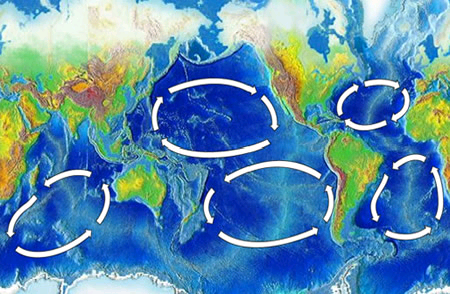Whether or not the ocean can continue to absorb human-produced carbon at past rates – taking up roughly one-third of all human carbon emissions – is still up in the air.
Previous studies on the topic have yielded conflicting results, says Galen McKinley, University of Wisconsin-Madison. But in a new analysis published online July 10, 2011 in Nature Geoscience, McKinley and her colleagues identify a likely source of confusion and provide some of the first observational evidence that climate change is negatively affecting the ocean carbon sink.
One of the biggest challenges in asking how climate is affecting the ocean is simply a lack of data, McKinley says, with available information clustered along shipping lanes and other areas where scientists can take advantage of existing boat traffic. With a dearth of other sampling sites, many studies have simply extrapolated trends from limited areas to broader swaths of the ocean.
McKinley and her colleagues expanded their analysis by combining existing data from a range of years (1981-2009), methodologies, and locations spanning most of the North Atlantic into a single time series for large regions called gyres, defined by distinct physical and biological characteristics.

They found a high degree of natural variability that often masked longer-term patterns of change and could explain why previous conclusions have disagreed. They discovered that apparent trends in ocean carbon uptake are dependent on exactly when and where you look; on the 10- to 15-year time scale, even overlapping time intervals sometimes suggested opposite effects.
McKinley said:
Because the ocean is so variable, we need at least 25 years’ worth of data to really see the effect of carbon accumulation in the atmosphere. This is a big issue in many branches of climate science –- what is natural variability, and what is climate change?
Working with nearly three decades of data, the researchers were able to cut through the variability and identify underlying trends in the surface CO2 throughout the North Atlantic.
During the past three decades, increases in atmospheric carbon dioxide have largely been matched by corresponding increases in dissolved carbon dioxide in the seawater. The gases equilibrate (balance) across the air-water interface, influenced by how much carbon is in the atmosphere and the ocean and how much carbon dioxide the water is able to hold as determined by its water chemistry.
But the researchers found that rising temperatures are slowing the carbon absorption across a large portion of the subtropical North Atlantic. Warmer water cannot hold as much carbon dioxide, so the ocean’s carbon capacity is decreasing as it warms. McKinley said:
The ocean is taking up less carbon because of the warming caused by the carbon in the atmosphere.
In watching for the effects of increasing atmospheric carbon on the ocean’s uptake, many people have looked for indications that the carbon content of the ocean is rising faster than that of the atmosphere, McKinley says. However, their new results show that the ocean sink could be weakening even without that visible sign. McKinley explained:
More likely what we’re going to see is that the ocean will keep its equilibration but it doesn’t have to take up as much carbon to do it because it’s getting warmer at the same time. We are already seeing this in the North Atlantic subtropical gyre, and this is some of the first evidence for climate damping the ocean’s ability to take up carbon from the atmosphere.
Bottom line: In a new analysis published online July 10, 2011 in Nature Geoscience, Galen McKinley, University of Wisconsin-Madison, and her colleagues identify a likely source of many inconsistencies in ocean global warming studies and provide some of the first observational evidence that climate change is negatively affecting the ocean carbon sink.











